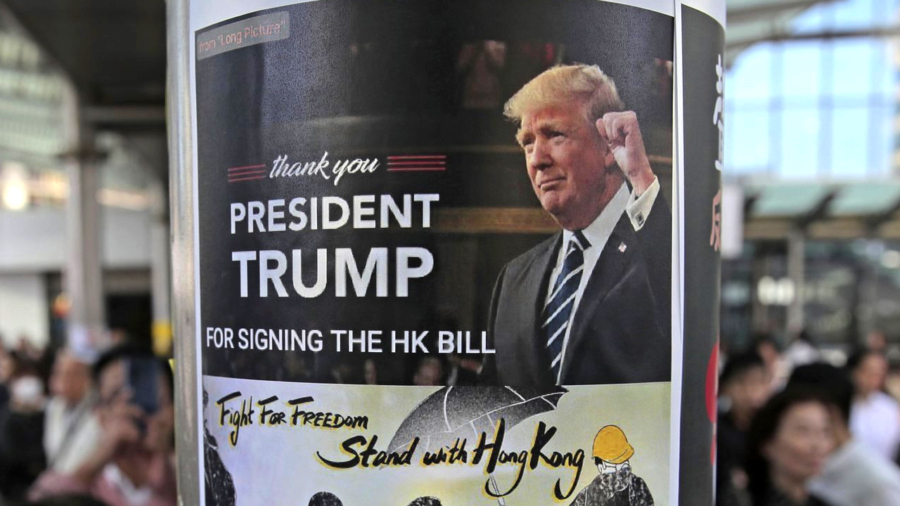The Chinese communist regime reacted furiously on Nov. 28 to President Donald Trump’s signing two bills aimed at supporting human rights in Hong Kong, summoning the U.S. ambassador to protest, and warning the move would undermine cooperation with Washington.
On Nov. 27, Trump signed the Hong Kong Human Rights and Democracy Act (S.1838) and another bill (S.2710) that would prohibit the export of control equipment to the Hong Kong police, who have been criticized for violent and heavy-handed tactics when dispersing protesters.
“I signed these bills out of respect for President Xi, China, and the people of Hong Kong,” Trump said in a statement Nov. 27. “They are being enacted in the hope that Leaders and Representatives of China and Hong Kong will be able to amicably settle their differences leading to long term peace and prosperity for all.”
The Hong Kong Human Rights and Democracy Act requires the U.S. Secretary of State to annually review whether the former British colony is “sufficiently autonomous” from China to justify its special economic privileges under the United States-Hong Kong Policy Act of 1992. Additionally, the law paves the way for sanctions on both Chinese and Hong Kong officials who have violated human rights in the city.
Thank you for all those in the U.S. Congress who have worked so hard to push the #HKHRDA in the past five years. Thank you for standing with our ppl.
This would not have been possible without the determination and sacrifices of brave Hongkongers.#StandwithHK
— Denise Ho (HOCC) (@hoccgoomusic) November 28, 2019
The Foreign Ministry announced that Vice Minister Le Yucheng had summoned U.S. Ambassador to China, Terry Branstad, to talks on Nov. 28, to directly protest the signing of the bills into law.
In a statement about the meeting, the U.S. Embassy in Beijing said “the Chinese Communist Party must honor its promises to the Hong Kong people.”
The United States “believes that Hong Kong’s autonomy, its adherence to the rule of law, and its commitment to protecting civil liberties are key to preserving its special status under U.S. law,” it said.
Trump’s signings have drawn widespread bipartisan support. Sen. Marco Rubio (R-Fla.) stated that the United States now has “new and meaningful tools to deter further influence and interference from Beijing into Hong Kong’s internal affairs.”
Today marks a historic day for US-Hong Kong relations – and a new era and phase to Hong Kongers’ ongoing struggle and fight to preserve their autonomy and freedoms and achieve democracy and universal suffrage. #HongKongHumanRightsandDemocracyAct #PROTECTHongKongAct
— HKDC (@hkdc_us) November 28, 2019
Washington-based nonprofit Hong Kong Democracy Council (HKDC), tweeted, “Our work at #HKDC now turns toward ensuring the U.S. admin make use of and implement fully the measures included in these laws.”
Alvin Yeung, a pro-democracy lawmaker and head of Hong Kong’s Civic Party, told local media on Nov. 28 that the two U.S. bills represented the international community’s acknowledgment of the voice of Hongkongers.
Yeung added that the Hong Kong government now has the responsibility of acting in accordance with international standards and to show the world that the “one country, two systems” model is being truly implemented in the city.
Thousands of protesters young and old turned out for a rally at a public square in the heart of Hong Kong’s business district on the evening of Nov. 28 to show their appreciation to the U.S. government for its passage of the bills.
Joshua Wong, activist and the iconic figure from the 2014 Umbrella Movement, tweeted that the Hong Kong Human Rights and Democracy Act “signifies fundamental change of U.S.’s China policy and a new stage of the U.S.-HK relation.”
“Moving on, @demosisto and I will continue our efforts in other countries to encourage similar legislative efforts and sanctions mechanism,” Wong added.
Epoch Times reporter Frank Fang and The Associated Press contributed to this report.


